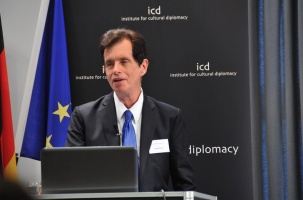Difference between revisions of "Jerry Edling"
| Line 4: | Line 4: | ||
[[File:Edling.jpg|400x200px|thumbnail|left]] | [[File:Edling.jpg|400x200px|thumbnail|left]] | ||
| − | Companies are becoming more adept at acting globally- they have to be. Going back to this Corporate Diplomacy course I’m taking, one of the measures of that course is how companies can act globally. So I think [[Cultural Diplomacy]] fits into that mindset, because to be a good corporate citizen, you have to understand Cultural Diplomacy, and you have to understand how other cultures work. It’s not all about business, even though business is a level-playing field and the world is getting flatter, to paraphrase Tom Friedman. | + | Companies are becoming more adept at acting globally- they have to be. Going back to this Corporate Diplomacy course I’m taking, one of the measures of that course is how companies can act globally. So I think [[Cultural Diplomacy]] fits into that mindset, because to be a good corporate citizen, you have to understand Cultural Diplomacy, and you have to understand how other [[Culture|cultures]] work. It’s not all about business, even though business is a level-playing field and the world is getting flatter, to paraphrase Tom Friedman. |
… | … | ||
Latest revision as of 14:35, 1 April 2014
The Many Facets of Diplomacy: Cultural, Corporate, Public, and Citizen By Jerry Edling (Editor in Chief, “PD” Magazine, University of Southern California; USA)
Companies are becoming more adept at acting globally- they have to be. Going back to this Corporate Diplomacy course I’m taking, one of the measures of that course is how companies can act globally. So I think Cultural Diplomacy fits into that mindset, because to be a good corporate citizen, you have to understand Cultural Diplomacy, and you have to understand how other cultures work. It’s not all about business, even though business is a level-playing field and the world is getting flatter, to paraphrase Tom Friedman.
…
Businesses have to be more cultural, and that’s where I think Cultural Diplomacy is going to become more and more of a growing field, because companies realize that they have to be aware of other cultures and be sort of cognizant of the whole. That’s a big lead for the United States because in the US, the business culture is so much of ‘Hi, how are you? Let’s get down to business,’ rather than getting to know the other person and getting to know the other person’s culture.
…
One of the things I’ve been taught in Public Diplomacy is that one of the purposes of Public Diplomacy, and by extension of Cultural Diplomacy, is to give countries the benefit of the doubt. If you’ve lived in a certain country, then you know its culture. Then if two countries get into a dispute over whatever, the whole idea is that people in country A are able to give the benefit of the doubt to country B, and say ‘Well, maybe we disagree with that policy, but I’ve lived there, I’ve known them,” and we can move forward on that.
…
I predict a huge rise in Citizen Diplomacy going forward, and it’s nothing that governments have to initiate. Citizens should have to decide this is something we’re going to do, and I think this is an area where people can lead and governments can follow.
- The Berlin Freedom of Expression Forum; Berlin, Germany, February 28th- March 2nd, 2012
